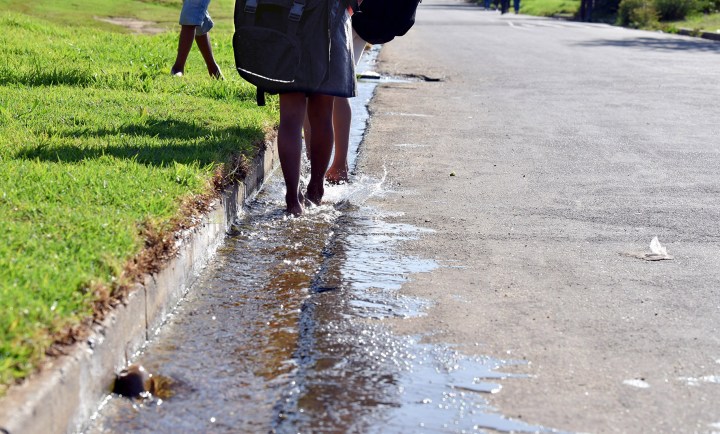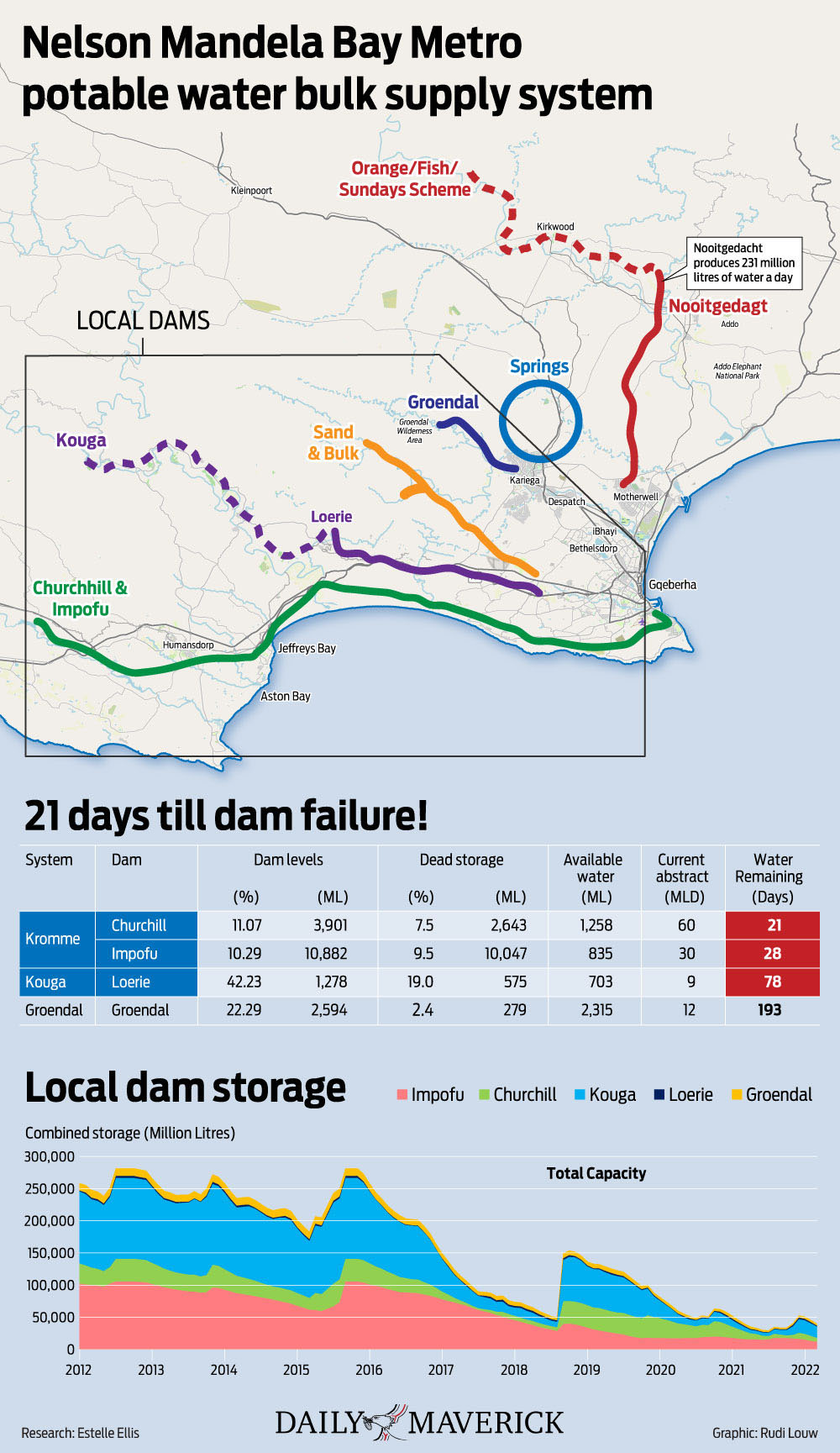21: COUNTDOWN TO CATASTROPHE
Plumbing teams’ midnight race to avert disaster in Nelson Mandela Bay

Calling for unity in the Nelson Mandela Bay community, Chris Moseki, acting director of climate change analysis in the Department of Water and Sanitation, said on Wednesday that the entire community must take responsibility for the little water that remained. And mayor Eugené Johnson, in a rare media statement, detailed how close the city came to the catastrophic collapse of a major pipeline.
‘In the late hours of Wednesday into the early hours of this cold [Thursday] morning, our teams dealt with a potentially severe challenge that threatened the entire water supply,” said Nelson Mandela Bay mayor Eugené Johnson.
“Our municipal team continued to work throughout the night to find the exact location of the fault. It was discovered and had to be carefully dismantled. The damaged section has been isolated and water supply has been opened to the metro.”
Teams eventually discovered that the fault was beneath a large gabion structure beside the 1200mm diameter pipe, which had to be carefully dismantled, according to a statement by the metro.
The Churchill Dam is likely to fail first unless the metro’s catchment area receives significant rain. The latest information supplied by the metro is that the dam has 21 days of water left, while the Impofu Dam is 28 days away from failing.

(Graphic: Rudi Louw)
The metro’s director of water and sanitation, Barry Martin, speaking in a Mandela Bay Development Agency webinar, said the usable water available to the metro is about 2% of the combined dam capacity. The rest was “dead storage” that could not be used.
And yet, he said, the daily personal use of water in Nelson Mandela Bay is still averaging about 200 litres of water per person.
“Behaviour change… it must be driven at all fronts,” Martin said.
Storage dams for the area were last full in 2015.
Martin said the metro suffered a longer drought between 1984 and 1992, but the population was smaller then and it had managed to cope.
He said tenders for a desalination plant at the Coega Development Zone had closed and the review process was under way.
A bigger desalination plant at Schoenmakerskop is also in the works, he said, and three borehole projects are scheduled to come online in September at the latest, with more scheduled for later.
“This crisis requires us to be open and very transparent with communities and all stakeholders so that we can start to work together towards finding long-lasting solutions,” said Johnson.
“Now is not the time for political grandstanding… this drought-induced water crisis affects all of us.
“The water augmentation schemes that are spearheaded by our infrastructure and engineering directorate are at different stages of implementation and are coming on stream in phases.
“Maintenance of infrastructure and attention to system faults are attended to with speed, and for that I must acknowledge the work of the infrastructure and engineering team… at times, they work under severe weather conditions and with no shortage of criticism,” Johnson said.
Fierce contestation expected for ANC deputy president position
The mayor said the city was engaging with the Nelson Mandela Bay Business Chamber to discuss ways of collaborating to address the crisis and tackle water leaks.
The city loses about 40% of its water to leaks and crumbling infrastructure.
Johnson said business in the metro had already agreed to fund billboards to create awareness of the crisis and spread the word that each person should use only 50 litres of water a day.
Call to residents
Water research specialists from across the country and various non-government organisations and universities discussed the water crisis in Nelson Mandela Bay in a webinar hosted by the Mandela Bay Development Agency.
Chris Moseki, acting director of climate change analysis in the Department of Water and Sanitation, called for residents to take joint responsibility to conserve the little water that was left.
“I seldom hear someone shouting at the [water] users,” he said.
“Water users must see themselves as part of the solution… Increasing water supply is not the only solution.”
He said it was true that Eastern Cape municipalities had, at 49%, scored the lowest when it came to the reliability of water supply, but suggested people shouldn’t “only focus on the government”.
Experts also discussed weather patterns that did not bode well for significant rain in Nelson Mandela Bay any time soon. Roelof Burger from North West University remarked: “I am sure these figures keep Barry [Martin] up at night.”
Prof Andries Jordaan from the University of the Free State said the metro had done a lot to mitigate the drought.
‘We can’t blame climate change’
“Most drought responses are too little and too late. We are in a water constrained economy. We cannot blame the current situation on climate change,” he said.
“We wait until we are in crisis and then we start to implement contingency measures. It must be done earlier, and also after the drought.”
Shafick Adams from the Water Research Commission agreed that climate change could not be blamed for everything. He said available sources of water should be diversified in a sophisticated and scientific way, and not just through the random drilling of boreholes.
“We must also focus on long-term maintenance,” he said. There had been instances where boreholes were drilled and then forgotten about, and municipalities no longer knew where they were.
The Mandela Bay Development Agency’s operations executive, Debbie Hendricks, said they were realigning plans to help with the water crisis as this was by far the most pressing priority in the city at the moment.
“Water is life. If there is no water, other plans make no sense,” she said. “It is difficult not to get into a dark spiral. The affluent will have choices, but what about the poor?”
She said there were already instances of water theft and of trucks carrying water containers being robbed.
Political instability
Within hours of the many calls for unity, the Democratic Alliance raised concerns that political instability in the metro continued to paralyse the work of the council.
On Thursday evening, the party accused the MEC for Cooperative Governance and Traditional Affairs, Xolile Nqatha, of contributing to raging political instability in the metro by refusing to preside over a council meeting.
Council Speaker, Gary van Niekerk, is engaged in a court battle to retain his position.
“[Nqatha] is effectively placing the metro under administration and contributing to political instability, chaos and nonexistent service delivery,” the DA’s metro leader Rano Kayser said.
“The DA had written to the mayor and the MEC, stating that given the legal uncertainty about the city manager’s appointment, and the litigation regarding the Speaker, a council meeting would only be legal if it is presided over by the MEC or a seconded official.
“Thereafter, an acting Speaker can be legally elected. This was the same legally compliant process followed when the adjustments budget was passed at the council meeting of 26 April 2022.
“Failing to conduct the meeting in such a manner would open any decisions taken by council to legal challenges and would further add to the chaos in council.”
An official notice had been issued for a council meeting to be held on Thursday.
“The MEC [Xolile Nqatha] was present at this meeting and he informed all parties present that he would not preside or second an official to preside over today’s [Thursday] council meeting.
“After the MEC had left the meeting, parties resolved that the Chief Whip of council and the executive mayor would engage the MEC again to reconsider his decision, as his actions were adding to the instability in the metro and rendering council unable to function.
“The DA also wrote to the MEC urging him to reconsider his position to preside.
“The failure of the MEC to second an official means that the DA could not attend today’s council meeting. If such a meeting proceeds and the election of an acting Speaker is presided over by either the city manager or the acting city manager, any decisions made would be open to legal challenges, as their legal ability to preside is in question.
“The DA is ready and willing to deal with the important matters that are on the council agenda, but the meeting must be conducted in a manner that is above legal reproach.
“Our intention is to bring stability to the council so that services can be delivered to residents. We will not participate in actions that will further muddy the waters,” Kruger said.
The DA and the ANC hold an equal number of votes in council, but the ANC managed to form a coalition government with smaller parties that won seats in the November 2021 local government elections. DM/MC
[hearken id=”daily-maverick/9472″]


















 Become an Insider
Become an Insider
Seems as tho’ the council is non-functional because the anc is non-functional. So The People suffer!
Its not just leaking pipes and other failings of the metro’s water reticulation infrastructure that compound the water crisis in Nelson Mandela Bay. The green and blue infrastructure in the catchments that feed the dams are in a parlous state. Alien plants, which are greedy water users, are reducing the river flows, as are a multitude of illegal dams on the on tributaries of both the Kromme and Kouga catchments. If these catchments were managed according to recommendations made by scientists, day zero could have been avoided. And in the midst of this crisis, funding for catchment management has been slashed. I am puzzled why this gets no attention from the media.